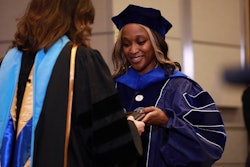With a high-profile announcement from the Obama administration last month, a consortium of 10 colleges and universities and nine nonprofit organizations led by Arizona State University researchers has launched a national initiative to “identify and scale effective evidence-based strategies to improve STEM (science, technology, engineering, and math) diversity in the nation’s colleges and universities with a special focus on women and girls of color from underrepresented communities.”
Jo Handelsman, associate director of the White House Office of Science Technology and Policy, formally announced formation of the National Academic STEM Collaborative, which is to be managed by the Arizona State University Center for Gender Equity in Science and Technology, or CGEST. CGEST executive director and Arizona State University associate Women and Gender Studies professor Kimberly A. Scott is leading the collaborative.
“Expanding diversity in STEM requires work on many, many fronts. It requires a diversity of efforts,” Handelsman said.
Handelsman has described the initiative as one addressing the “need to transform the way STEM is taught” given the growing diversity in K-12 and college student populations in the U.S.
“By encouraging innovations in STEM teaching, addressing the issue of bias, and also awareness of the types of teaching we use, we are trying to promote positive images of scientists and engineers and promote new ways of teaching that will benefit a broad group of diverse students,” Handelsman said in a statement.
The collaborative is expected to establish comprehensive online resources, such as education tool kits and workshops, which will disseminate proven best practices in STEM education. Other expected outcomes will be tracking systems that monitor the progress of women of color pursuing STEM degrees and training efforts that target teachers, hiring managers and executives in helping them eliminate bias in schools and the workplace.
Scott notes that “too many African-American, Latina and Native American women are pushed out of the STEM experience” during their college years. Hailed as an innovative leader in the realm of creating STEM opportunities for minority females, Scott is the founder of the nationally-recognized CompuGirls program, which introduces adolescent girls from underserved school districts to digital technology.





















